King George (17 page)
Authors: Steve Sheinkin

Shortly after the Revolution,
King George III
, age fifty, began to suffer from a mysterious illness that doctors now believe to have been porphyria. He experienced intense stomach pain, rashes, confusion, and episodes of what witnesses described as “madness”âfor instance, one night at dinner he attempted to smash the Prince of Wales's head against the wall. In spite of the work of ignorant doctors, the king's health improved. He continued to suffer similar attacks until his death in 1820, at age eighty-one.
King George III
, age fifty, began to suffer from a mysterious illness that doctors now believe to have been porphyria. He experienced intense stomach pain, rashes, confusion, and episodes of what witnesses described as “madness”âfor instance, one night at dinner he attempted to smash the Prince of Wales's head against the wall. In spite of the work of ignorant doctors, the king's health improved. He continued to suffer similar attacks until his death in 1820, at age eighty-one.
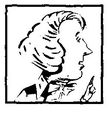
George Washington's young aide
Alexander Hamilton
went on to become one the main architects of the new American government and economy. Some historians say he was the most brilliant of all the Founders, which is really saying something. But the way he died was not so smart. Caught up in a bitter feud with Vice President Aaron Burr, he agreed to duel Burr with pistols. Hamilton was shot and killed in 1804, at the age offorty-seven.
Alexander Hamilton
went on to become one the main architects of the new American government and economy. Some historians say he was the most brilliant of all the Founders, which is really saying something. But the way he died was not so smart. Caught up in a bitter feud with Vice President Aaron Burr, he agreed to duel Burr with pistols. Hamilton was shot and killed in 1804, at the age offorty-seven.
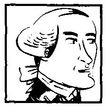
John Hancock
remained the most popular politician in Massachusetts throughout his entire life, serving nine terms as governor. As he grew older, painful attacks of gout swelled his joints and left him unable to walk. When Massachusetts was debating ratification of the Constitution, however, and it looked like state leaders might vote no, Hancock got involved. He wrapped his aching legs in blankets, had himself carried into the meetinghouse, and announced, “I give my assent to the Constitution.” Massachusetts approved the Constitution in a very close vote.
remained the most popular politician in Massachusetts throughout his entire life, serving nine terms as governor. As he grew older, painful attacks of gout swelled his joints and left him unable to walk. When Massachusetts was debating ratification of the Constitution, however, and it looked like state leaders might vote no, Hancock got involved. He wrapped his aching legs in blankets, had himself carried into the meetinghouse, and announced, “I give my assent to the Constitution.” Massachusetts approved the Constitution in a very close vote.
By the way, you'll recall that on the night of Paul Revere's famous ride, young Dorothy Quincy said of her fiancé, John Hancock: “At that time I should have been very glad to have got rid of him.” Dorothy and John were married in August 1775. They lived happily together until John's death in 1793.
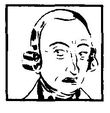
After serving in the Virginia legislature and as state governor,
Patrick Henry
retired from government in 1791. Heavily in debt, Henry revived his old legal practiceâand his reputation as the most exciting courtroom lawyer in the country. One reason he had to keep making money was that he continued fathering children into his sixties. In 1798 his second wife, Dorothea, gave birth to Henry's seventeenth child. Henry died the next year, at age sixty-three.
Patrick Henry
retired from government in 1791. Heavily in debt, Henry revived his old legal practiceâand his reputation as the most exciting courtroom lawyer in the country. One reason he had to keep making money was that he continued fathering children into his sixties. In 1798 his second wife, Dorothea, gave birth to Henry's seventeenth child. Henry died the next year, at age sixty-three.
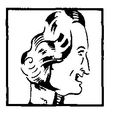
After serving as the country's first secretary of state, second vice president, and third president,
Thomas Jefferson
began a busy retirement at Monticello, his Virginia home. In addition to designing buildings and founding the University of Virginia, Jefferson made peace with his old political rival John Adams. Jefferson and Adams exchanged more than 150 letters, discussing current events, political philosophy, and the hardships of growing old. Jefferson, like Adams, died on July 4, 1826âexactly fifty years from the day their Declaration of Independence was approved.
Thomas Jefferson
began a busy retirement at Monticello, his Virginia home. In addition to designing buildings and founding the University of Virginia, Jefferson made peace with his old political rival John Adams. Jefferson and Adams exchanged more than 150 letters, discussing current events, political philosophy, and the hardships of growing old. Jefferson, like Adams, died on July 4, 1826âexactly fifty years from the day their Declaration of Independence was approved.
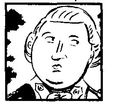
Before the Revolution he ran a bookstore, but by. the end of the war
Henry Knox
was one of the country's top military experts. Knox served ten years as the first secretary of war before retiring with his wife, Lucy, to a mansion in Maine. Always known as great entertainers, Henry and Lucy immediately won over their new neighbors by inviting more than five hundred of them to a massive Fourth of July festival.
Henry Knox
was one of the country's top military experts. Knox served ten years as the first secretary of war before retiring with his wife, Lucy, to a mansion in Maine. Always known as great entertainers, Henry and Lucy immediately won over their new neighbors by inviting more than five hundred of them to a massive Fourth of July festival.
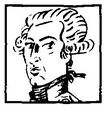
Marie Jean Paul Joseph RocheYves Gilbert du Motier, also known as the
Marquis de Lafayette,
returned to a hero's welcome in France. He was an early leader of the French Revolution; then, due to events much too complicated to explain here, he fled France and wound up spending six years in an Austrian prison. Thirty years later he made one last tour of the United States. He was greeted like a rock star.
Marquis de Lafayette,
returned to a hero's welcome in France. He was an early leader of the French Revolution; then, due to events much too complicated to explain here, he fled France and wound up spending six years in an Austrian prison. Thirty years later he made one last tour of the United States. He was greeted like a rock star.

After leaving the Continental army,
Joseph Plumb Martin
spent a year teaching in New York, then settled in Maine. He married, had a large family, and, at the age of seventy, published a book called
A Narrative of a Revolutionary Soldier: Some of the Adventures, Dangers, and Sufferings of Joseph Plumb Martin.
Martin's book gives us one of the best inside looks at life in the Continental army.
Joseph Plumb Martin
spent a year teaching in New York, then settled in Maine. He married, had a large family, and, at the age of seventy, published a book called
A Narrative of a Revolutionary Soldier: Some of the Adventures, Dangers, and Sufferings of Joseph Plumb Martin.
Martin's book gives us one of the best inside looks at life in the Continental army.
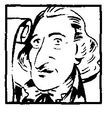
Thomas Paine
continued writing and traveling and offending others with his opinions. After nearly being jailed in Britain, and nearly getting beheaded in France during the French Revolution, Paine died penniless in New York City in 1809. His death went unnoticed, except by a British admirer who secretly dug up Paine's bones and put them on a boat to Britain. No one knows what happened to them.
continued writing and traveling and offending others with his opinions. After nearly being jailed in Britain, and nearly getting beheaded in France during the French Revolution, Paine died penniless in New York City in 1809. His death went unnoticed, except by a British admirer who secretly dug up Paine's bones and put them on a boat to Britain. No one knows what happened to them.

Returning to private life after the war,
Paul Revere
ran a hardware store, made bells and cannons, and continued his work as a master silversmith. As always, he was ready to drop everything to protect his town. When it looked like the British were about to attack Boston during the War of 1812, Revere grabbed a shovel and wheelbarrow and helped fortify the city. He was eighty years old.
Paul Revere
ran a hardware store, made bells and cannons, and continued his work as a master silversmith. As always, he was ready to drop everything to protect his town. When it looked like the British were about to attack Boston during the War of 1812, Revere grabbed a shovel and wheelbarrow and helped fortify the city. He was eighty years old.
Other books
Her Darkest Nightmare by Brenda Novak
Mazes of Scorpio by Alan Burt Akers
The Newborn Vampire by Evenly Evans
Holding Hannah by Maren Smith
Night in Eden by Candice Proctor
Flesh-Eater (Book 1): Fear the Fever by Broadbent, Stacey
Corsair by Dudley Pope
Death of a Songbird by Goff, Christine
The Temptress by C. J. Fallowfield, Karen J, Book Cover By Design
A Wedding Wager by Jane Feather